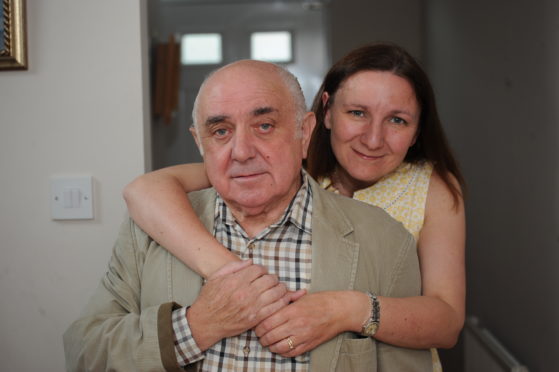A leading Angus figure is urging people to be aware of a life threatening condition, after almost losing his daughter to the condition.
Angus Provost Ronnie Proctor spoke out just after the first anniversary of his daughter Fiona contracting sepsis.
Fiona Kantzidis, 44, began to feel unwell, prompting a mercy dash by the emergency services and was rushed to hospital, where the fast actions of medics saved her life.
He said: “The phone rang at 5.30 in the morning, and I knew instinctively from the sound of Fiona’s voice that something was seriously wrong.
“She complained of feeling unwell and confused, and I immediately told her to call an ambulance.
“She lives in Falkirk, and we are fortunate that that the ambulance crew were extremely professional and got her to the hospital quickly.
“Once she was admitted to Forth Valley Hospital, the care was fantastic and she was immediately admitted to the ICU to begin treatment – she was in ICU for around a week.
How to spot sepsis in adults
- Slurred speech or confusion
- Extreme shivering or muscle pain
- Passing no urine (in a day)
- Severe breathlessness
- It feels like you’re going to die
- Skin mottled or discoloured
- For more information see sepsistrust.org
“We still don’t know exactly what happened, but the specialists say timing was everything, and getting her to the hospital so quickly made all the difference.
“Any delay, and best outcome could have been losing a leg, but the worst case scenario is that she could have died.
“I want people to know just how serious this condition is and make them aware of the symptoms, because the fact is, that sepsis is not just deadly, it can have longer term complications.”
Sepsis is a life threatening complication of infection, and if not treated fast enough, it can lead to loss of limbs or death.
The condition arises when the body’s response to an infection spirals rapidly out of control, damaging its own tissues and organs, and can quickly lead to shock, multiple organ failure and death.
The early symptoms and signs of the condition are very high or low temperature, uncontrollable shivering, rapid heartbeat and fast or difficult breathing.
In some cases, symptoms of more severe sepsis include feeling dizzy or faint, and confusion or slurred speech.
Symptoms of sepsis can multiply and get worse very quickly, and if any combination of these symptoms are found, then immediate action must be taken.
Chief medical officer Catherine Calderwood recently said that while deaths caused by sepsis have fallen by 21% since 2012, it is still vital that people are aware of this potentially fatal condition.










